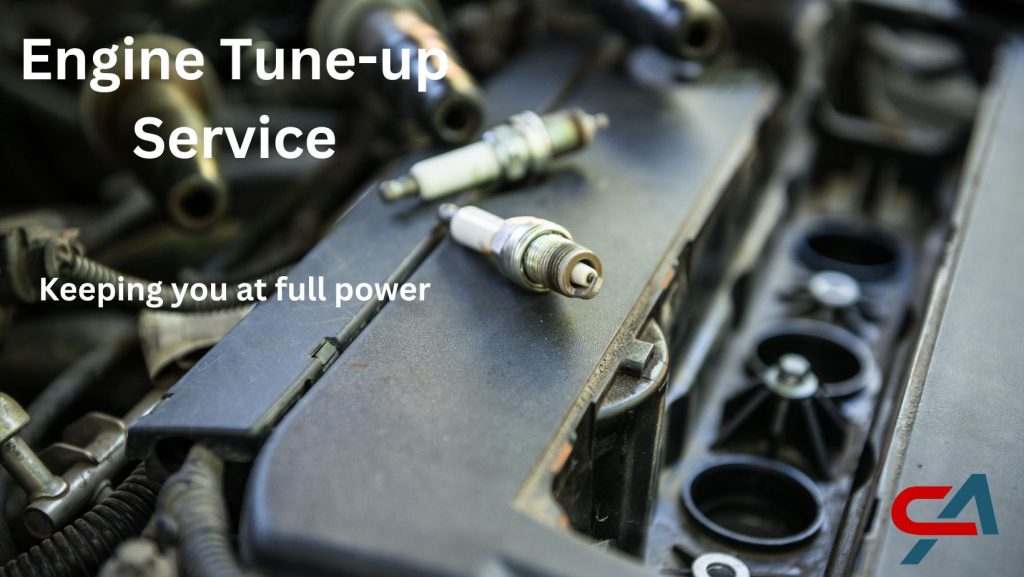Fine-Tuning Performance: A Comprehensive Guide to Engine Tune-Up Services
Just like a musical instrument requires regular tuning to produce harmonious melodies, your vehicle benefits from periodic tune-ups to ensure optimal performance. In this detailed guide, we’ll explore the intricacies of tune-up services, shedding light on what they entail, why they matter, and how they contribute to keeping your vehicle running smoothly.
Tune-Up Services Unveiled: Harmonizing the Engine Symphony
A tune-up is a comprehensive maintenance service to inspect, adjust, and replace critical components of your vehicle’s engine and related systems. The goal is to optimize performance, fuel efficiency, and overall reliability.
Components Addressed in a Tune-Up: The Orchestra of Engine Health
Spark Plugs:
One of the fundamental elements addressed in a tune-up is the replacement or adjustment of spark plugs. These components play a crucial role in igniting the air-fuel mixture within the engine cylinders.
Ignition System:
The entire ignition system is inspected, and if necessary, components such as ignition coils, spark plug wires, and the distributor cap are examined and replaced.
Fuel System:
The fuel system undergoes scrutiny, with fuel injectors being cleaned or replaced and the fuel filter inspected. This ensures proper fuel delivery and combustion efficiency.
Air Filter:
The air filter is checked and replaced if needed. A clean air filter ensures the engine receives a sufficient and uncontaminated air supply for combustion.
PCV (Positive Crankcase Ventilation) Valve:
The PCV valve is examined for proper functioning. This component is responsible for venting harmful gases from the engine crankcase.
Belts and Hoses:
Belts, such as the serpentine belt and hoses, are inspected for wear and tear. Worn-out belts and hoses can lead to engine overheating and other issues.
Fluid Levels and Quality:
Fluid levels, including engine oil, transmission fluid, brake fluid, and coolant, are checked. Fluids are topped off or replaced if needed to maintain proper levels and quality.
Battery and Charging System:
The battery is inspected for corrosion, and the charging system, including the alternator and starter, is tested to ensure they operate correctly.
Exhaust System:
The exhaust system, including the catalytic converter and muffler, is inspected for leaks, damage, or signs of wear.
Timing and Idle Speed:
The timing and idle speed are adjusted to manufacturer specifications. This ensures that the engine runs smoothly and efficiently.
Service Intervals: Timing the Melody of Maintenance
The frequency of tune-up services can vary based on the vehicle’s make and model, mileage, and driving conditions. It is essential to consult your vehicle’s owner’s manual for manufacturer recommendations on tune-up intervals.
Signs Your Vehicle Needs a Tune-Up: Listening to the Symphony of Warning Signs
Decreased Fuel Efficiency:
If you notice a sudden drop in fuel efficiency, it may indicate that your vehicle is due for a tune-up. Improperly functioning components can lead to inefficient combustion.
Engine Misfires:
Misfires, characterized by a jerking or sputtering sensation, may signal issues with the ignition system or spark plugs.
Rough Idling:
An engine that idles roughly or inconsistently may benefit from a tune-up. Various factors, including spark plug issues or air filter blockages, can cause this.
Difficulty Starting:
If your vehicle struggles to start, it could be due to a weakened battery, faulty ignition components, or issues with the fuel system—all of which a tune-up can address.
Warning Lights on Dashboard:
Dashboard warning lights, such as the check engine light, may illuminate to indicate potential issues that a tune-up can diagnose and resolve.
Lack of Power:
A decreased engine power or responsiveness may indicate that components like spark plugs or fuel injectors are not functioning optimally.
Professional Tune-Up Service: Fine-Tuning by Experts
While some vehicle owners may opt for DIY maintenance, professional tune-up services offer a comprehensive and expert approach. Trained technicians possess the knowledge and tools to identify and address potential issues, ensuring your vehicle receives the care it deserves.
Benefits of Regular Tune-Up Services: Orchestrating Peak Performance
Optimized Engine Performance:
Regular tune-ups optimize engine performance, ensuring all components work together seamlessly for efficient combustion and power delivery.
Enhanced Fuel Efficiency:
Adequately tuned engines operate more efficiently, improving fuel efficiency and reducing emissions.
Extended Engine Life:
By addressing issues proactively, tune-ups contribute to the engine’s longevity and components, reducing the likelihood of significant breakdowns.
Reduced Emissions:
A well-tuned engine produces fewer harmful emissions, contributing to environmental sustainability.
Improved Reliability:
Vehicles that undergo regular tune-ups are more reliable, reducing the risk of unexpected breakdowns and ensuring a smoother driving experience.
Cost Savings in the Long Run:
While tune-up services involve an upfront cost, the long-term benefits, including improved fuel efficiency and reduced likelihood of major repairs, contribute to cost savings over time.
Manufacturer Recommendations: Adhering to Service Intervals for Optimal Performance
To maintain peak performance, it is crucial to adhere to the tune-up intervals recommended by the manufacturer. Following these guidelines ensures that your vehicle receives timely and appropriate maintenance.
Just as a musical instrument requires regular tuning to produce beautiful melodies, your vehicle benefits from periodic tune-ups to harmonize its internal components by understanding the components addressed in a tune-up, recognizing signs that your vehicle may need one, and appreciating the benefits of regular service, you can ensure that your vehicle continues to operate at its best, delivering a smooth and reliable performance on every journey.

